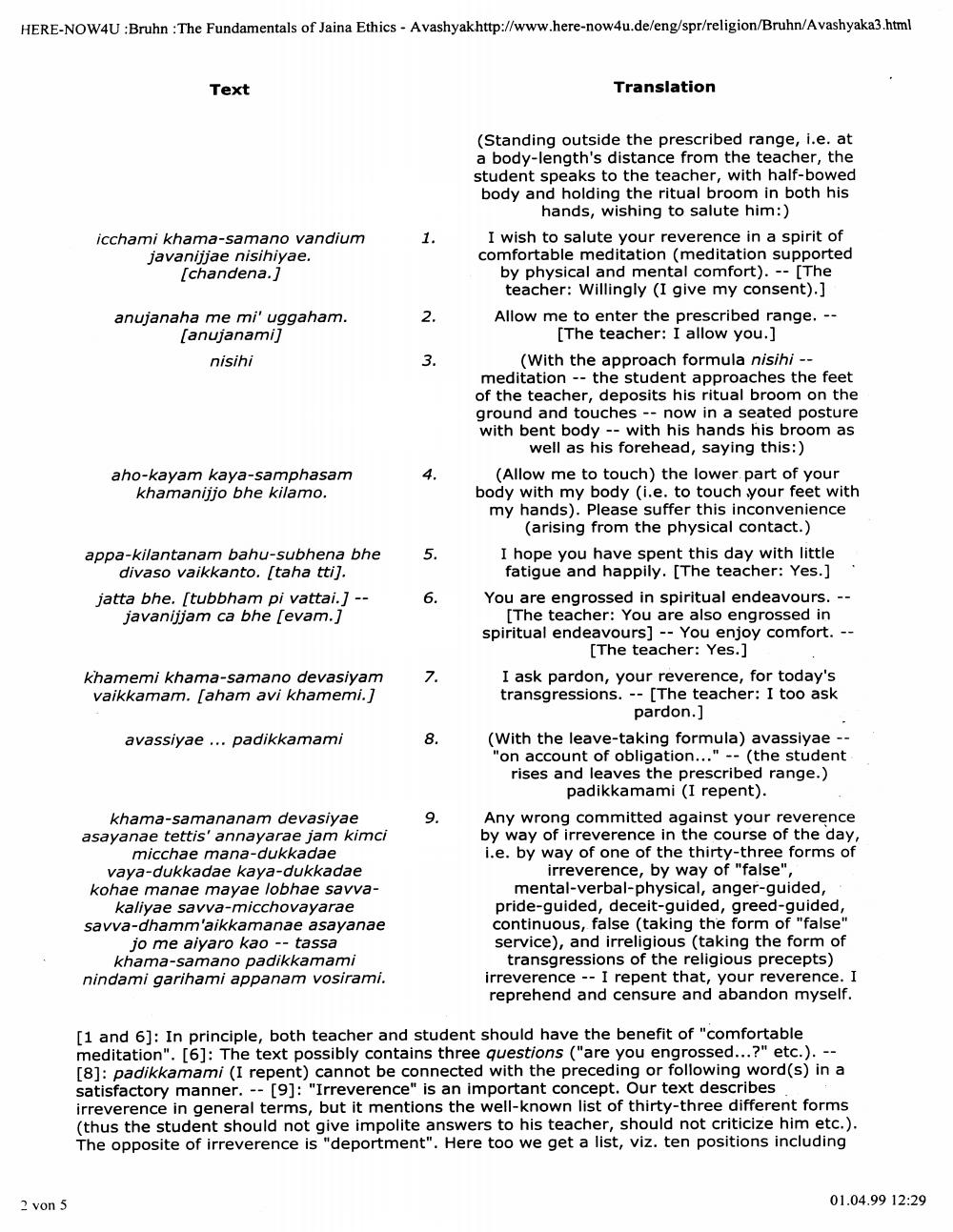________________
HERE-NOW4U :Bruhn : The Fundamentals of Jaina Ethics - Avashyak http://www.here-now4u.de/eng/spr/religion/Bruhn/Avashyaka3.html
Text
Translation
icchami khama-samano vandium
javanijjae nisihiyae.
[chandena.]
anujanaha me mi' uggaham.
[anujanami]
nisihi
aho-kayam kaya-samphasam
khamanijjo bhe kilamo.
appa-kilantanam bahu-subhena bhe
divaso vaikkanto. [taha tti). jatta bhe. (tubbham pi vattai.] --
javanijjam ca bhe [evam.]
(Standing outside the prescribed range, i.e. at a body-length's distance from the teacher, the student speaks to the teacher, with half-bowed body and holding the ritual broom in both his
hands, wishing to salute him:) I wish to salute your reverence in a spirit of comfortable meditation (meditation supported
by physical and mental comfort). -- [The
teacher: Willingly (I give my consent).] Allow me to enter the prescribed range. --
[The teacher: I allow you.] (With the approach formula nisihi -- meditation -- the student approaches the feet of the teacher, deposits his ritual broom on the ground and touches -- now in a seated posture with bent body -- with his hands his broom as
well as his forehead, saying this:) (Allow me to touch) the lower part of your body with my body (i.e. to touch your feet with my hands). Please suffer this inconvenience
(arising from the physical contact.) I hope you have spent this day with little
fatigue and happily. [The teacher: Yes.) You are engrossed in spiritual endeavours. --
[The teacher: You are also engrossed in spiritual endeavours) -- You enjoy comfort. --
[The teacher: Yes.] I ask pardon, your reverence, for today's transgressions. -- [The teacher: I too ask
pardon.) (With the leave-taking formula) avassiyae -- "on account of obligation..." -- (the student rises and leaves the prescribed range.)
padikkamami (I repent). Any wrong committed against your reverence by way of irreverence in the course of the day, i.e. by way of one of the thirty-three forms of
irreverence, by way of "false", mental-verbal-physical, anger-guided, pride-guided, deceit-guided, greed-guided, continuous, false (taking the form of "false" service), and irreligious (taking the form of
transgressions of the religious precepts) irreverence -- I repent that, your reverence. I reprehend and censure and abandon myself.
6.
7.
khamemi khama-samano devasiyam vaikkamam. (aham avi khamemi.]
avassiyae ... padikkamami
9
khama-samananam devasiyae asayanae tettis' annayarae jam kimci
micchae mana-dukkadae vaya-dukkadae kaya-dukkadae kohae manae mayae lobhae savva
kaliyae savva-micchovayarae savva-dhamm'aikkamanae asayanae
jo me aiyaro kao -- tassa khama-samano padikkamami nindami garihami appanam vosirami.
[1 and 6]: In principle, both teacher and student should have the benefit of "comfortable meditation". [6]: The text possibly contains three questions ("are you engrossed...?" etc.). -- [8]: padikkamami (I repent) cannot be connected with the preceding or following word(s) in a satisfactory manner. -- [9]: "Irreverence" is an important concept. Our text describes irreverence in general terms, but it mentions the well-known list of thirty-three different forms (thus the student should not give impolite answers to his teacher, should not criticize him etc.). The opposite of irreverence is deportment". Here too we get a list, viz. ten positions including
2 von 5
01.04.99 12:29




